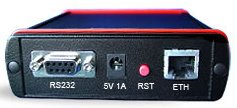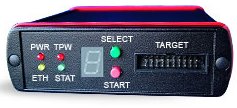Debug tool supports Linux on DaVinci CPUs
Oct 4, 2007 — by LinuxDevices Staff — from the LinuxDevices Archive — 3 views Austrian hardware tools vendor Ronetix has released a new firmware update for its combo JTAG/BDM emulator and flash programmer. The update brings support for “all DaVinci CPUs with an ARM926 core” to the company's PEEDI (“powerful embedded Ethernet debugging interface”) device.
Austrian hardware tools vendor Ronetix has released a new firmware update for its combo JTAG/BDM emulator and flash programmer. The update brings support for “all DaVinci CPUs with an ARM926 core” to the company's PEEDI (“powerful embedded Ethernet debugging interface”) device.
The PEEDI is said to support high-speed GNU gdb debugging via Ethernet on a wide variety of architectures, including ARM/XScale, PowerPC, ColdFire, and Blackfin. Additionally, when attached via JTAG, the PEEDI device can be used to program 8- and 16-bit NAND flash via the NAND controllers integral to many popular system-on-chip processors. Currently, about 800 different flash devices are said to be supported.


The PEEDI, front and back
(Click to enlarge)
The newest PEEDI firmware update adds support for Texas Instruments (TI) DM644x DaVinci processors, including the TMS320DM6446, TMS320DM6443, and TMS320DM6441. In addition to an ARM926 application processor core and TMS320C64x DSP core, these parts boast a NAND controller with system boot capabilities. Thus, “many hardware designers” choose to use only NAND flash in systems based on these DaVinci parts, Ronetix says.
Furthermore, support for “several flash profiles” is said to enable the PEEDI to program “a complete Linux system at once [including] UBL, U-BOOT, Linux Kernel, [and] JFFS2 root file system.” The PEEDI firmware added JFFS2 support about a year ago.
Additional touted PEEDI features and specs include:
- Various methods for ECC calculating, including:
- bad block management and clean markers
- hardware ECC using the DaVinci NAND Flash controller for UBL and JFFS2
- standard software ECC for JFFS2
- ECC for YAFFS2
- Automatic generation of UBL descriptors — the file image is relocated with one NAND Flash page and the skipped page is filled by PEEDI, Ronetix says
- Supports up to four cores
- “Built-in” support for gdb (remote target via Ethernet)
- Claimed download speeds to 1.25 Mbps
- 5 kHz – 33MHz JTAG/BDM clock using 35cm standard cable
- Measuring and compensating of delays in the JTAG signals
- Target voltage 1.2V – 5V
- Built-in telnet command line interface
- Supports use as a standalone flash programmer with front panel interface, and room for 15 images on an MMC/SD card
- Small robust aluminum case
- DCC over TCP support
In addition to marketing its own PEEDI device, Ronetix distributes software development kits and development boards for various architectures. Historically, the PEEDI has been priced at about 1,500 Euros (about $2,110), although updated pricing information was not provided.
This article was originally published on LinuxDevices.com and has been donated to the open source community by QuinStreet Inc. Please visit LinuxToday.com for up-to-date news and articles about Linux and open source.